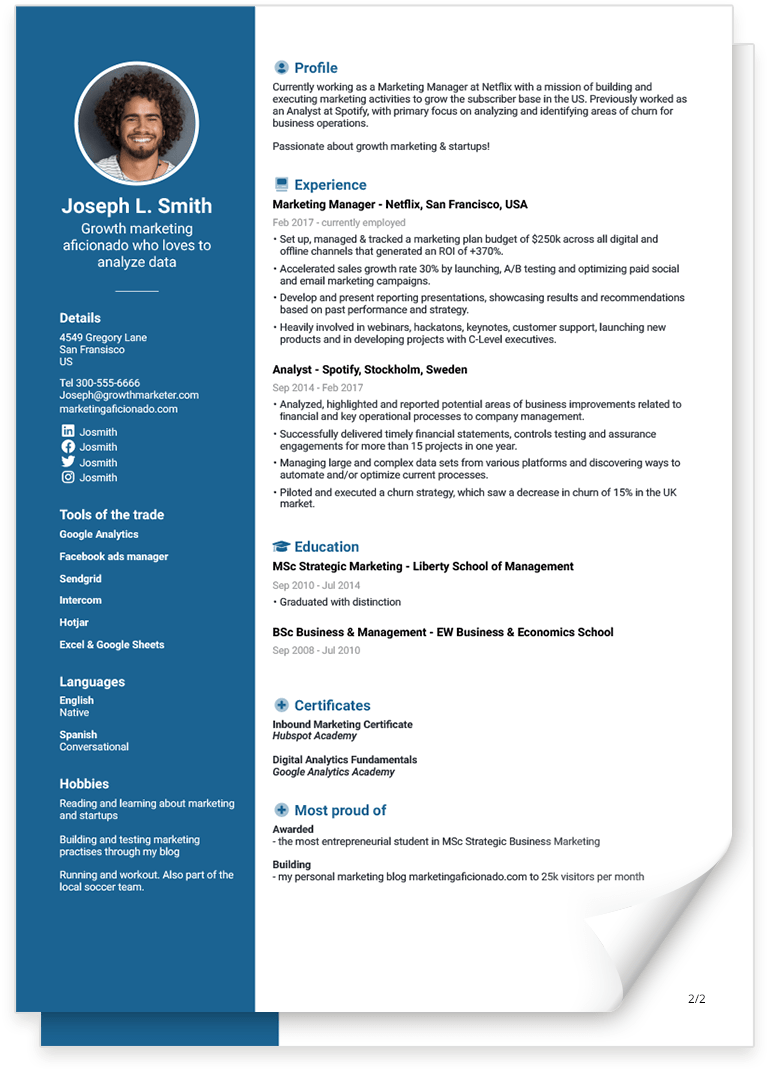The Best CV Format For Freshers [examples]
![The Best CV Format For Freshers [examples]](https://jofibostorage.blob.core.windows.net/blog/the-best-cv-format-for-freshers-header.png)
If you are reading this, it probably means you’re a fresher.
Or, in other words, you’re straight out of school and ready for your first real job.
All you need now is a great CV suitable for freshers to get you started. Well, you’ve come to the right place. In the following article we will show you which CV format is best suited for freshers.
This guide will cover the following topics:
- What is a fresher CV?
- How many CV formats are there?
- What are the differences between the formats?
- What is the best CV format for freshers?
What is a fresher CV?
CV is short for curriculum vitae which is Latin for course of life.
It is a document in which you typically list your professional skills, work experience, education, scholarships, achievements, and awards.
It should be very concise and built around a specific job description. In other words, you should always tailor your CV to match the job description.
A fresher CV is the CV you make for your first job applications right after finishing school.
Think of your CV as a personal marketing tool. It’s a document you show to a potential employer with the goal of selling yourself and your skills. It is the absolutely most important document you have when it comes to your job search. The right CV can get you to lots of interviews. And the wrong CV can do just the opposite.
There are some specific pieces of information that are necessary in your CV. If you use a CV template most of them will have these sections.
How do I make my fresher CV?
We suggest that you create your CV using these easy steps:
- Start by filling out all your personal information
- Move on to filling out employment history and education(s)
- Add appropriate custom sections such as volunteer work, personal projects, or a third
- Fill out skills and languages
- Additional sections you can add are volunteer experience and personal projects
Remember, you can always move sections up and down and adjust your CV to fit your needs.
When you create a fresher CV, chances are you will not have a lot of employment history and experience to add. But if you have had any relevant part time jobs while studying, or even volunteer experience, they will be very helpful in differentiating your application.
With these points covered, you’re well on your way towards getting your first job.
Next up are the different CV formats you can choose between. How many are there and which one should you go for?
How many CV formats are there? And what are their differences?
Basically, there are three main formats out there:
- The reverse-chronological CV format
- The functional CV format
- The combination CV format (also known as hybrid)
Let's go through all three formats to give you a better idea of how they are different and what each one’s strengths are.
The reverse-chronological CV
The first format, and the most widely used one too, is the reverse-chronological CV.
In a reverse-chronological CV you emphasize your experience and employment history (with the most recent experiences first - hence reverse).
Here, you will start by listing all of your previous employment history and professional experiences in a reverse chronological order. This format is the most simple one and the one hiring managers see most often.
It’s built up like this:
- Your full name
- Professional title (match it with the title in the job description)
- Contact details such as city, zip code, country, phone number, and your (professional) email
- Personal profile (a very short summary of who you are and what you’re all about - match it to the job description)
- Experience and employment history (takes up majority of the space)
- Education and qualifications
- Skills
The functional CV
The second format is the functional format. This is also known as the skill-based format since it mainly emphasizes an applicant’s skills instead of the employment history. For this reason it is also the least used CV format and a lot of hiring managers don’t care for it much.
It’s built up like this:
- Your full name
- Professional title (match it with the title in the job description)
- Contact details such as city, zip code, country, phone number, and your (professional) email
- Personal profile (a very short summary of who you are and what you’re all about - match it to the job description)
- Skills (take up majority of the space)
- Experience and employment history
- Education and qualifications
The combination CV
Lastly, we have the combination CV, also known as the hybrid CV.
The name almost says it all: the combination CV format is exactly that, a combination of both the chronological and the functional CV.
With the combination CV format you get the best of two worlds. You will first list your skills and qualifications. Next comes your employment history. This way you get to highlight those skills that are relevant to the job position while still providing the recruiter with your work history.
It’s built up like this:
- Your full name
- Contact details such as city, zip code, country, phone number, and your (professional) email
- Skills
- Additional skills
- Experience and employment history
- Education and qualifications
Note, you can move the skills and experience sections around but always make sure the additional skills section follows after the skills section.
What is the best CV format for freshers?
There are a few ways you can write your fresher CV. The two we would recommend are the reverse-chronological CV and the combination CV.
It is possible to make both of these formats work for you, even if you don’t have a lot of work experience yet. Focus on your courses, achievements, skills, internships, online portfolios, volunteering, and awards instead.
See an example of a reverse-chronological CV format for freshers here:
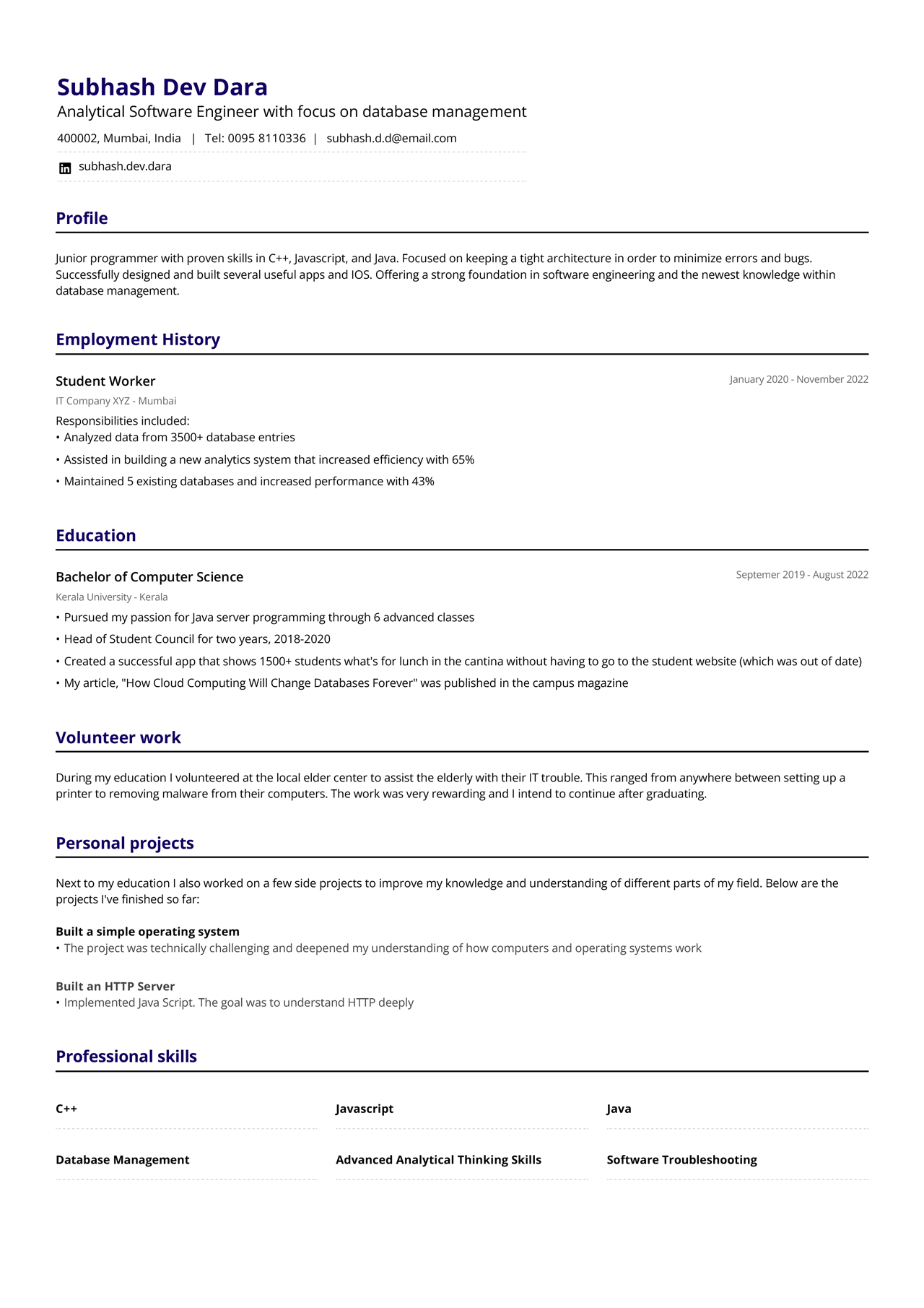
Even though the student in the CV does not have a lot of employment history, the fresher CV is still full of relevant experiences. The use of custom sections such as Personal Projects (which is one of Jofibo’s great benefits) perfectly shows off the fresher’s skills, experiences and motivations.
See an example of a combination CV format here:
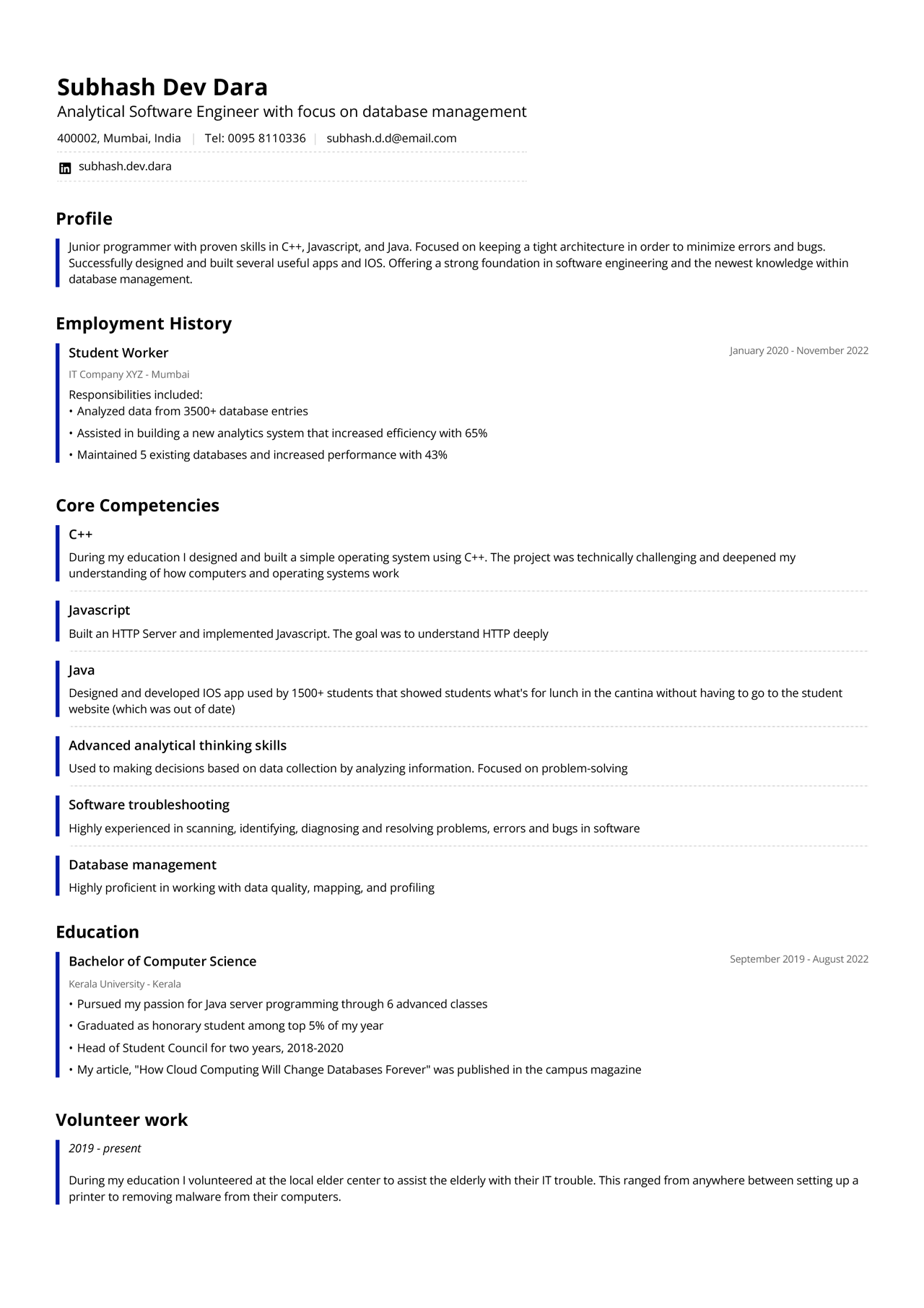
If you’re a fresher, and looking for the easiest way to get started on your fresher CV, we’ve got you covered. With our intuitive CV templates it will be no problem to find the best fresher CV format for you.
More CV examples for freshers
Below are a few more fresher CV examples to be inspired from.
CV with no experience
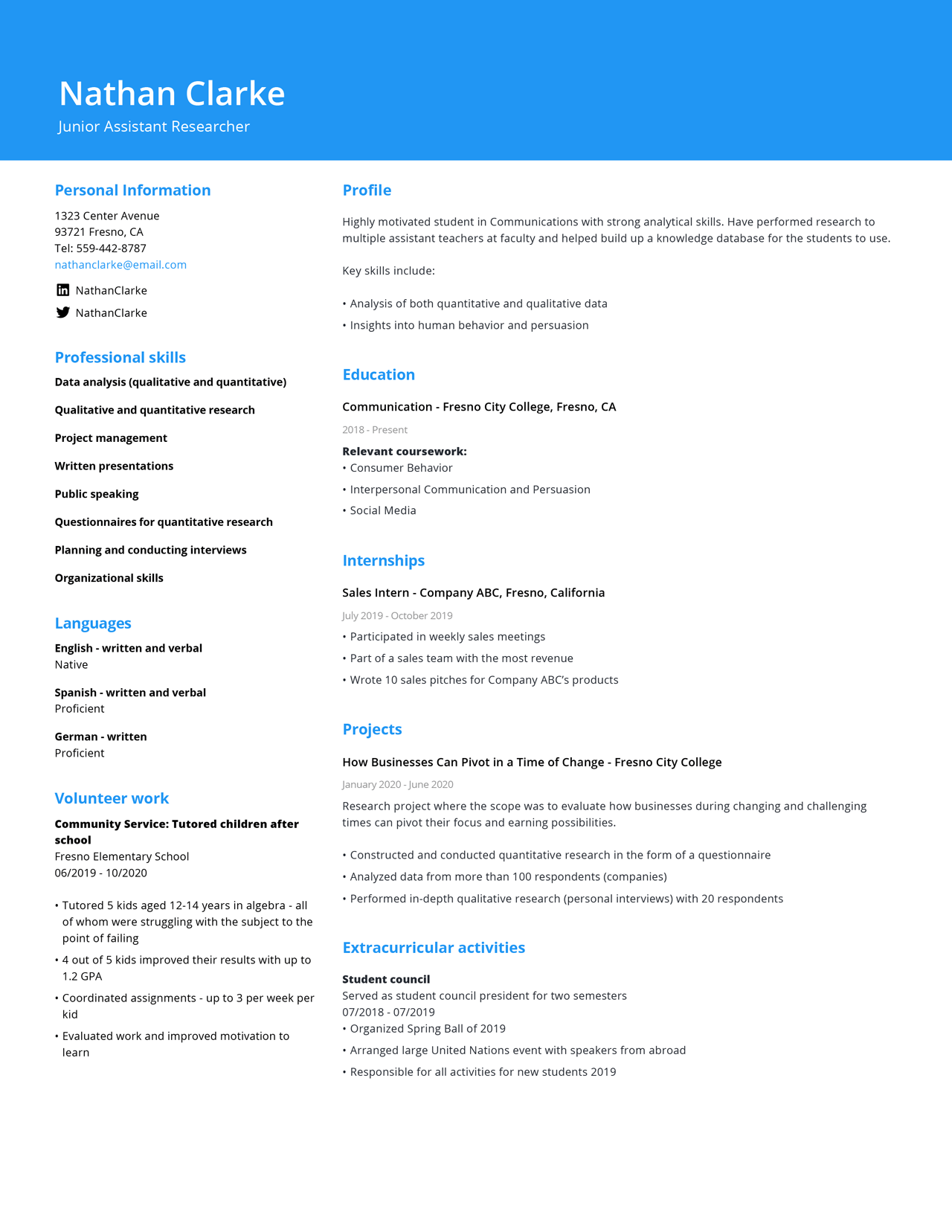
Student CV
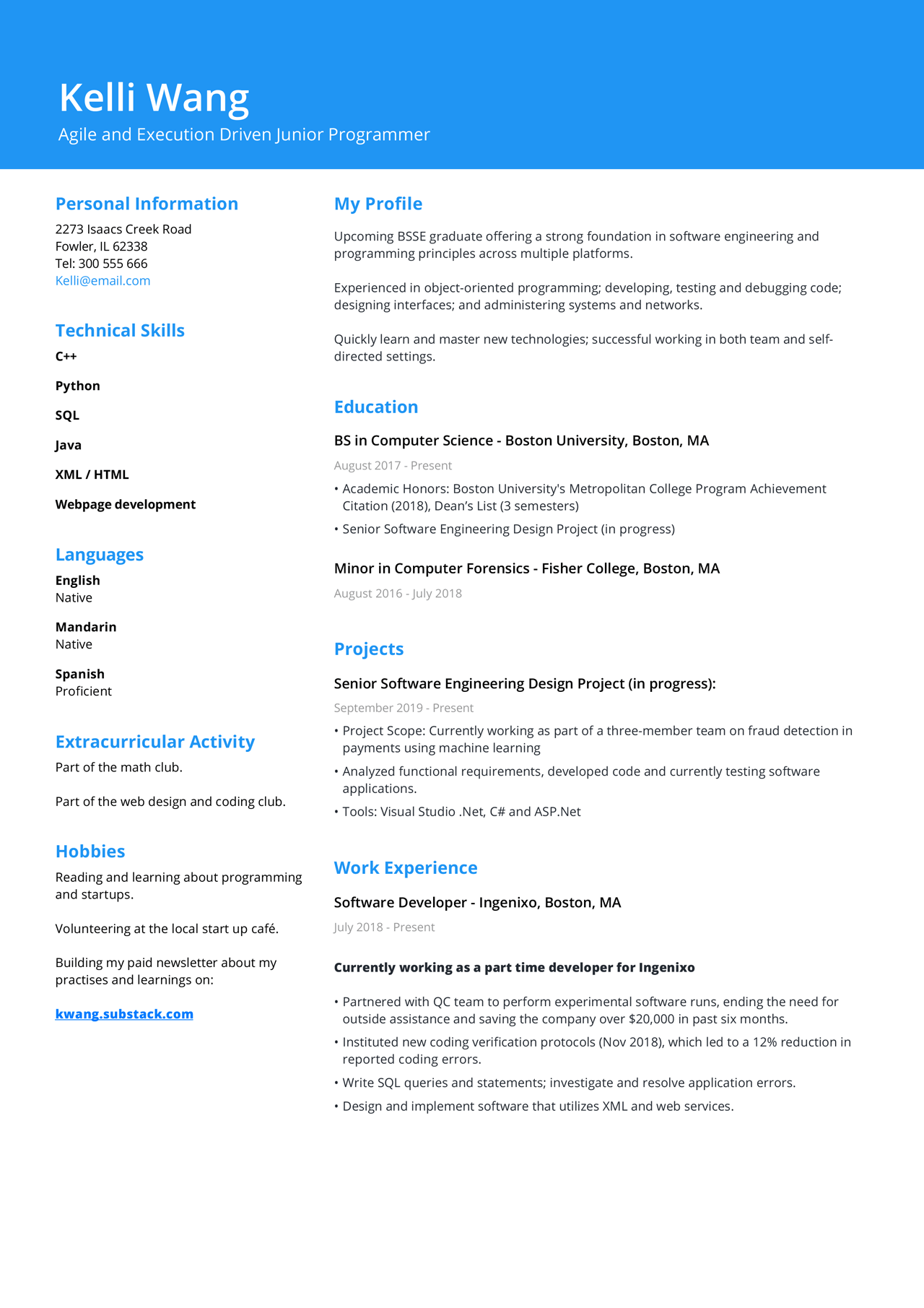
![CV Format Guide for 2025 [With 10+ Examples]](https://jofibostorage.blob.core.windows.net/blog/cv-format-guide-header.png)
![Nursing Resume Example & Guide [2025]](https://jofibostorage.blob.core.windows.net/blog/Nursing-resume-example-and-guide.png)

